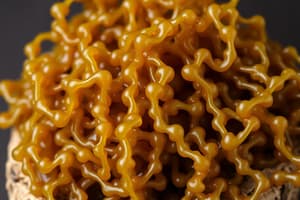Podcast
Questions and Answers
Which polysaccharide found in seaweeds is known for its linear copolymer structure of D-mannuronic and L-guluronic acid?
Which polysaccharide found in seaweeds is known for its linear copolymer structure of D-mannuronic and L-guluronic acid?
- Alginate (correct)
- Cellulose
- Agar
- Carrageenan
What type of proteins in seaweeds are known to exhibit unique functions such as antifouling agents?
What type of proteins in seaweeds are known to exhibit unique functions such as antifouling agents?
- Transport proteins
- Storage proteins
- Enzymes (correct)
- Structural proteins
Which of the following statements about lipids in seaweeds is true?
Which of the following statements about lipids in seaweeds is true?
- Lipids are the predominant component in seaweeds.
- Lipids are found in higher quantities than proteins.
- Fatty acid composition can change based on environmental factors. (correct)
- Seaweeds contain a variety of cholesterol only.
Which pigment is primarily responsible for photosynthesis in seaweeds?
Which pigment is primarily responsible for photosynthesis in seaweeds?
Seaweeds are recognized as a good source of which mineral important for thyroid function?
Seaweeds are recognized as a good source of which mineral important for thyroid function?
Which vitamin is commonly found in seaweeds and is known for its antioxidant properties?
Which vitamin is commonly found in seaweeds and is known for its antioxidant properties?
What are the primary nucleic acids found in seaweeds?
What are the primary nucleic acids found in seaweeds?
Which type of enzymes found in seaweeds are involved in lipid metabolism?
Which type of enzymes found in seaweeds are involved in lipid metabolism?
Flashcards
What are the major types of carbohydrates found in seaweeds?
What are the major types of carbohydrates found in seaweeds?
Seaweeds store energy as complex carbohydrates, like alginate, carrageenan, and agar.
What is alginate made of?
What is alginate made of?
Alginate is a long chain molecule made of two sugars: D-mannuronic and L-guluronic acid.
What types of proteins are found in seaweeds?
What types of proteins are found in seaweeds?
Seaweeds contain different proteins like enzymes, structural proteins, and storage proteins.
Seaweeds are a great source of which minerals?
Seaweeds are a great source of which minerals?
Signup and view all the flashcards
What are the pigments that give seaweed its different colors?
What are the pigments that give seaweed its different colors?
Signup and view all the flashcards
What are nucleic acids and how are they important to seaweeds?
What are nucleic acids and how are they important to seaweeds?
Signup and view all the flashcards
What are enzymes and what role do they play in seaweeds?
What are enzymes and what role do they play in seaweeds?
Signup and view all the flashcards
Why are seaweeds considered a good source of protein?
Why are seaweeds considered a good source of protein?
Signup and view all the flashcards
Study Notes
Carbohydrates
- Seaweeds are rich in complex carbohydrates, primarily polysaccharides.
- These polysaccharides include alginate, carrageenan, and agar.
- Alginate is a linear copolymer of D-mannuronic and L-guluronic acid.
- Carrageenan is composed of sulfated galactans.
- Agar is a mixture of agarose and agaropectin.
- These polysaccharides have different structural properties, leading to diverse applications in food, pharmaceuticals, and cosmetics.
Proteins
- Seaweeds contain a variety of proteins, including enzymes, structural proteins, and storage proteins.
- The protein content varies significantly between different seaweed species.
- Some proteins exhibit unique functions, like antifouling agents or bioactive compounds.
- Essential amino acids are often present, contributing to the nutritional value of seaweed.
Lipids
- Lipids in seaweeds are generally present in smaller quantities compared to carbohydrates.
- Lipids include fatty acids, sterols (like cholesterol), and phospholipids.
- The fatty acid composition can be influenced by environmental factors such as temperature and nutrient availability.
- Some seaweeds have high amounts of specific lipid compounds with potential health benefits.
Pigments
- Seaweeds contain various pigments that contribute to their color, enabling them to photosynthesize.
- Chlorophyll a is a primary pigment found in all seaweeds, similar to plants.
- Other pigments, like phycobilins (phycoerythrin, phycocyanin), are responsible for the red and blue colors in certain species.
- These pigments can have antioxidant properties and may be used in functional foods.
Minerals and Vitamins
- Seaweeds are a good source of various minerals, including iodine, potassium, calcium, magnesium, and iron.
- The mineral content differs significantly between species and growing conditions.
- Seaweeds are also a good source of vitamins, including vitamin K, vitamin C, and vitamin B.
- Certain vitamins are present in seaweed in a form that the body can easily absorb.
Nucleic Acids
- Seaweeds contain nucleic acids, DNA and RNA, like other organisms.
- They are present in quantities that vary compared to other substances, but are an essential component of cell structure.
Enzymes
- Seaweeds have a wide range of enzymes involved in different metabolic processes.
- These include enzymes for carbohydrate metabolism, protein synthesis, and lipid metabolism.
- Some enzymes display unique activities, such as potential antiviral or antitumor properties.
Secondary Metabolites
- Seaweeds often produce secondary metabolites with various biological activities.
- These compounds may include anti-inflammatory compounds, antioxidants, and bioactive substances.
- Specific secondary metabolites vary widely depending on the species.
Environmental Influences
- Factors like nutrient availability, water temperature, salinity, and light intensity impact the biochemical composition of seaweeds.
- These conditions affect the production of certain compounds and impact the overall biodiversity.
- Seasonal variations also play a role in the biochemical profile of seaweeds.
Studying That Suits You
Use AI to generate personalized quizzes and flashcards to suit your learning preferences.




